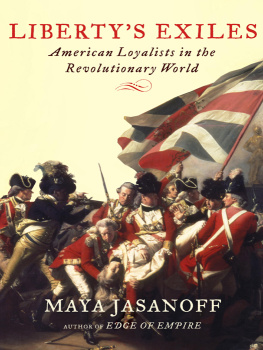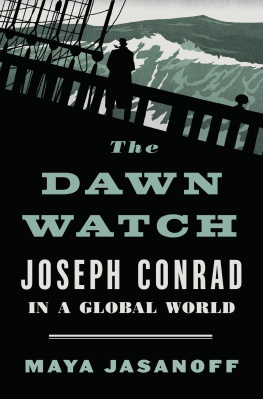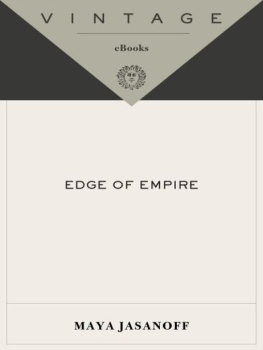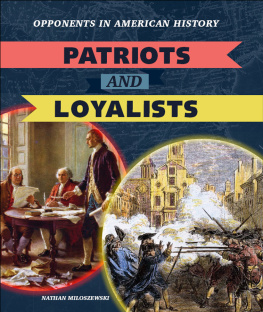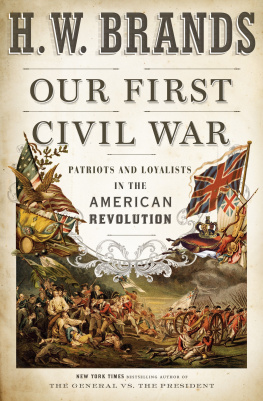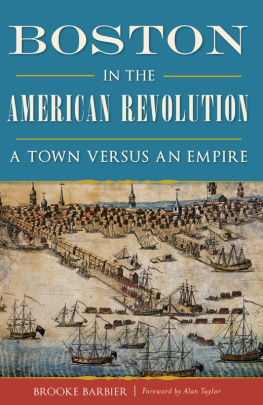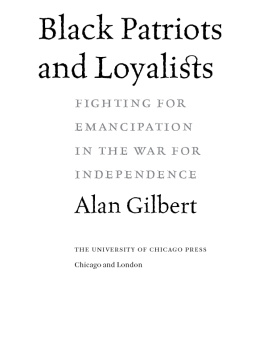ACKNOWLEDGMENTS
W HILE WRITING THIS BOOK I have been repeatedly struck by how interconnected its subjects remained, despite the great distances they traveled. Letters linked friends and family members across oceans; neighbors in one setting became neighbors again in others. My own research has been consistently helped along by analogous small-world connections, whether through the wonders of technology or the still more wondrous generosity of colleagues, students, friends, and sometimes strangers. In the process I have racked up deeper and more numerous debts than these few pages can adequately express.
Many of those acknowledged below read portions of this manuscript, and my first thanks goes to them for their suggestions, as well as to the numerous audiences who responded to this project as a work in progress. For especially extensive readings of earlier drafts, I am grateful to David Armitage, Joyce Chaplin, Nicholas Dawidoff, Sam Haselby, Sheila Jasanoff, Jill Lepore, Peter Marshall, Marco Roth, Laurel Ulrich, and Megan Williams. Linda Colley not only read the entire manuscript but has continued to provide me with exceptional encouragement, advice, and inspiration. Jerry Bannister, Michel Ducharme, and Amani Whitfield offered invaluable assistance with Canadian history. I have also been the lucky beneficiary of the wisdom and support of other scholars who have so expertly traced these routes before me, particularly Mary Beth Norton, Cassandra Pybus, and Simon Schama.
I wrote this book in two centers of revolutionary America, each of which has left its mark on the final product. I began it as a member of the history department at the University of Virginia. I cannot imagine a more sympathetic environment in which to have had the privilege of beginning my teaching career. Among the many colleagues with whom I enjoyed memorable conversations on matters historical and otherwise, I want to thank Rich Barnett, Lenard Berlanstein, Claudrena Harold, Krishan Kumar, Chuck McCurdy, Christian McMillen, Elizabeth Meyer, Joe Miller, Duane Osheim, Sophie Rosenfeld, and Mark Thomas. Andrew OShaughnessy has been an unfailingly gracious interlocutor, and kindly lent me the Roosevelt Cottage as I began my revisions. One of the special pleasures of my time at Virginia was to work alongside my very first teacher of eighteenth-century British history, Paul Halliday, a model scholar and friend. Another was to gain firsthand appreciation of Peter Onufs extraordinary capacity for mentorship. Peter, together with Charlottesvilles lively group of early Americanists, has profoundly influenced my understanding of this subject.
At Harvard, I have had the equally great privilege of finishing this book in an academic setting that has exposed me to exciting new ways of seeing international and global history. My gratitude extends to all my departmental colleagues, notably Ann Blair, Sugata Bose, Vincent Brown, Joyce Chaplin, Caroline Elkins, Alison Frank, Peter Gordon, Andy Jewett, Mary Lewis, Erez Manela, Ian Miller, Emma Rothschild, Rachel St. John, and Judith Surkis; and my chairs Lizabeth Cohen, Andrew Gordon, and James Kloppenberg. To David Armitage, Niall Ferguson, and Mark Kishlansky my debts are especially copious. They have greatly enriched my approach to British history and how to write it, and given me much good counsel and conversation along the way. I also want to acknowledge those who have facilitated my life at Harvard in more practical respects, including Paul Dzus, Janet Hatch, Cory Paulsen, Anna Popiel, and Sandy Selesky; and several students who have contributed to this endeavor in various technical ways: Sarah Burack, Christa Dierksheide, Erik Linstrum, Noah McCormack, and Tim Rogan.
This book could not have been completed as fully or efficiently without ample support from Harvard and the University of Virginia; the National Endowment for the Humanities; the John W. Kluge Center at the Library of Congress; the Robert H. Smith International Center for Jefferson Studies; the MacDowell Colony; and a Charles A. Ryskamp Fellowship from the American Council of Learned Societies. A fellowship at the New York Public Librarys Dorothy and Lewis B. Cullman Center for Scholars and Writers did more than fund my work. It allowed me to join a vibrant creative and intellectual community under the expert leadership of Jean Strouse. My warmest thanks to Jean, Betsy Bradley, Pamela Leo, Adriana Nova, and my fellow fellowsespecially David Blight, Jim Miller, Jim Shapiro, Jeff Talarigo, and Sean Wilentzfor an unforgettable year.
From Toronto and London to Kingston and Nassau, I was fortunate to enjoy the hospitality of, among others, Stephen Aranha, Richard Bourke, Simon Dickie, and my dear friends and too-frequent hosts in London, Michael Dresser and Martin Reading. Julian Gardner and his family gave me a memorable welcome in Kasganj. My research in Sierra Leone could not have taken place without the incredible help extended to me by Freddy Shabaka Cole, Aminatta Forna, Peter Hanson-Alp, Alpha Kanu, Abu Koroma, Philip Misevich, Joe Opala, Ambassador June Carter Perry, Danna Van Brandt, and everybody at Country Lodge.
At Knopf, Carol Janeway has once again brought her sage editorial touch to this book. Further thanks go to the fantastically capable Liz Lee for stewarding it through publication, and to Knopfs superb production team for all their dedication and patience. At HarperPress, I have enjoyed the special pleasure of being published by my old friend Arabella Pike; and am grateful for the contributions of Sophie Goulden and others involved in this project at Harper, as well as to Mitzi Angel for her early participation. Without the magnificent Andrew Wylie, and his tremendous staff on both sides of the Atlantic, this book might never have appeared in the first place.
Throughout this project I have been engaged, enlightened, and entertained by conversations with my friends and fellow historians Jeffrey Auerbach, Michael Dodson, Richard Drayton, Franois Furstenberg, Durba Ghosh, Evan Haefeli, David Hancock, Lorenz Lthi, Philip Stern, Robert Traversand the late Stephen Vella, who is missed. William Dalrymple has been a strong believer in this project from the outset and I have gained much from his continuing friendship and his writerly example. Among my many debts for congenial company in Charlottesville, New York, and Cambridge, some fall due to Nuri Akgul, Sabri Ates, Douglas Fordham, Healan Gaston, Sam Haselby, Glenn Horowitz, Andy Jewett, Adam Kirsch, Remy Holzer Kirsch, John Nemec, Basharat Peer, Bahare Rashidi, Ananya Vajpeyi, and Heidi Voskuhl.
It would take another book to express my gratitude for the sustaining friendshipin the ether, the airwaves, and locations too numerous to itemizeof Duncan Chesney, Anna Dale, Josiah Osgood, Marco Roth, Neil Safier, Jesse Scott, Kirk Swinehart, Megan Williams, Nasser Zakariya, and Julie Zikherman. Indeed, I might never have formulated this topic without Kirk, who introduced me to Molly and Joseph Brant in my first week of graduate school. I can only hope that the years ahead will hold ample chances for me to return at least some of these accumulated favors.
This book is about families dispersed and displaceda theme that must have attracted me in part because of my own mixed and immigrant heritage. So it has been a marvelous accident of history to find myself completing it with my immediate family all living within the same square mile. Alan, Luba, and Nina have given me fresh perspectives and many happy hours of domestic distraction. My parents Jay and Sheila have again been unfailing sources of everything from home-cooked meals to editorial inputand the titleas well as bed-rocks of understanding and support. Sadly the journeys of my grandmothers Edith Jasanoff and Kamala Sen ended before this book was done. Their tales of earlier lives in other worlds kindled my own first instincts as a storyteller, and I dedicate this result to their memory.

